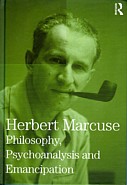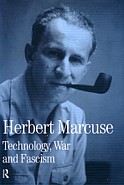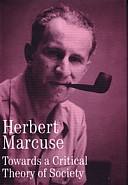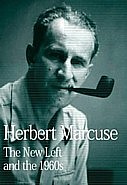Volume V: Philosophy, Psychoanalysis and Emancipation  (Collected Papers of Herbert Marcuse, vol.
5)[Dec. 2010] (Collected Papers of Herbert Marcuse, vol.
5)[Dec. 2010]
- publisher's website with table of contents, and description:
"Edited by Douglas Kellner and Clayton Pierce, Philosophy, Psychoanalysis and Emancipation is the fifth volume of Herbert Marcuse's collected papers. Containing some of Marcuse’s most important work, this book presents for the first time his unique syntheses of philosophy, psychoanalysis, and critical social theory, directed toward human emancipation and social transformation.
Within philosophy, Marcuse engaged with disparate and often conflicting philosophical perspectives - ranging from Heidegger and phenomenology, to Hegel, Marx, and Freud - to create unique philosophical insights, often overlooked in favor of his theoretical and political interventions with the New Left, the subject of previous volumes. This collection assembles significant, and in some cases unknown texts from the Herbert Marcuse archives in Frankfurt, including:
- critiques of positivism and idealism, Dewey’s pragmatism, and the tradition of German philosophy
- philosophical essays from the 1930s and 1940s that attempt to reconstruct philosophy on a materialist base
- Marcuse’s unique attempts to bring together Freud and philosophy
- philosophical reflections on death, human aggression, war, and peace
- Marcuse’s later critical philosophical perspectives on science, technology, society, religion, and ecology.
A comprehensive introduction by Douglas Kellner, Tyson Lewis and Clayton Pierce places Marcuse’s work in the context of his engagement with the main currents of twentieth century politics and philosophy. An Afterword by Andrew Feenberg provides a personal memory of Marcuse as scholar, teacher and activist, and summarizes the lasting relevance of his radical thought."
- $99 at amazon
- Contents:
- Introduction (1)
by
Douglas Kellner, Tyson Lewis, & Clayton Pierce
- Part 1: Philosophical Interventions (76)
1. Theses on Scientific Philosophy
2. Schiller’s Humanism
3. Critique of Dewey’s Logic
4. Critique of Dewey’s Theory of Valuation
5. Idealism and Positivism
- Part 2: Psychoanalytic Interventions (101)
6. Reply to Fromm
7. Theory and Therapy in Freud
8. Obsolescence of Psychoanalysis
9. The Ideology of Death
- Part 3: From Ontology to Technology (132)
10. From Ontology to Technology
- Part 4: Philosophical Reflections on Science and Technology (141)
11. World without Logos
12. The Malcontent in the Affluent Society
13. Anthropological Perspectives on Technology
14. Phenomenology and Science
15. Responsibility of Science
- Part 5: Philosophy in the Contemporary World (160)
16. On the Position of Thinking Today
17. Overcoming Domination
18. Peace as Utopia
19. The Relevance of Reality
20. The Role of Religion in Society
- Part 6: Conversation with Marcuse in Psychology Today (189)
21. Conversation with Marcuse in Psychology Today
- Part 7: Late Philosophical/Political Reflections (206
22. Ecology and Modern Society
23. Children of Prometheus: 25 Theses on Technology and Society
24. KPBS Interview on "Critical Philosophy"
- Part 8: Afterword (234)
25. Andrew Feenberg, Remembering Marcuse
- Index (242)
|



 For
biographical information about Douglas Kellner, see
For
biographical information about Douglas Kellner, see  (Collected Papers of Herbert Marcuse, vol.
4)[Dec. 2006]
(Collected Papers of Herbert Marcuse, vol.
4)[Dec. 2006] 